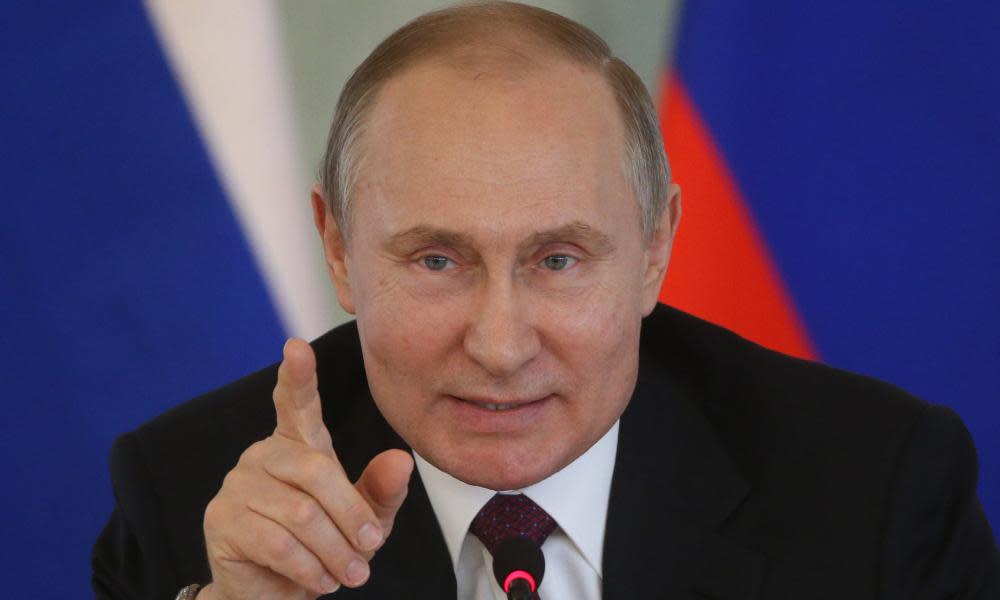Russian police put the squeeze on election observers before vote

Days before Russia’s presidential elections, police are trying to seize documents that give activist observers access to polling stations and a leading elections watchdog has unexpectedly seen its office lease revoked.
“You shouldn’t hold this event here or you’ll have trouble,” Roman Udot, a representative for the independent Golos Association elections watchdog, said his landlord was told by police before they ripping up the contract.
The “event” was a call centre to field reports of election violations. The government denies interfering.
Russia’s short, frustrating, and listless presidential campaign is grinding to its inevitable conclusion. Even Vladimir Putin hardly seems enthused, devoting less than two minutes to a final campaign speech in Crimea, the peninsula he annexed from Ukraine in 2014 to domestic acclaim and international condemnation.
“I am hugging you all dearly,” Putin told the thousands in attendance, as he concluded an astonishingly short speech that crowds had waited hours to see.
Beyond the lacklustre battle for votes this Sunday, there is a fiercer one over the vote monitors, as the opposition under Alexei Navalny backs a boycott and the Kremlin seeks legitimacy. Putin is expected to win Sunday’s vote handily, but the key question remains turnout and opposition election monitors hope to be able to catch those padding the numbers in the act.
In recent weeks, police have raided several Navalny headquarters in the regions seeking documents called “directions” that allow observers to visit poll stations.
On Friday, the central elections committee stepped in. “We are not creating any barriers for anyone and will not allow it,” said Ella Pamfilova, the committee’s head, censuring overzealous police. Pamfilova, a former rights ombudsman, was tapped by the Putin administration in 2016 to improve the blemished reputation of Russia’s elections. She appears to have little clout.
Meanwhile, the Russian government has invited hundreds of friendly, and sometimes fringe, foreign politicians to create an international stamp of approval for the vote.
Officials in Crimea said this week they are expecting a foreign delegation including Andreas Maurer, the head of the far-left Die Linke party faction in a city council in Lower Saxony, as well as Hendrik Weber, the founder of a public organisation called People Diplomacy Norway.
They might seem like political lightweights, but their role in Crimea is clear. “Observers from Germany and Norway will come to Crimea for the presidential elections,” Rossiyskaya Gazeta, Russia’s state paper, wrote in a headline this week. In contrast, monitoring missions for both the EU and the OSCE’s Office for Democratic Institutions and Human Rights, which has requested 420 short-term observers for the vote, have refused to monitor the vote on the peninsula.
They are some of the more than 300 “reputable foreign politicians” who will come to monitor the vote, Leonid Slutsky, the embattled head of the Russian State Duma’s foreign affairs committee, said this week.
Those also include Pedro Agramunt, the former leader of Europe’s parliamentary assembly, who was stripped of his powers last year after meeting the Syrian president, Bashar al-Assad. Slutsky also named Jordi Shukla, a Spanish politician who travelled with Agramunt to Syria.
The highest profile member of the delegation was Thierry Mariani, a prominent French politician seen as the informal head of the country’s pro-Russia lobby, who led a delegation of French lawmakers on a controversial visit to Crimea in 2015.
“The majority of people we have met seem happy to be back in Russia,” he said in a press conference there.
Of the more than 1,300 reported foreign election monitors, the largest number – 223 – will come from the former Soviet republic of Kazakhstan. President Nursultan Nazarbayev won more than 97% of a 2015 presidential vote to extend his 25-year rule as that country’s president.
For observers working without the Kremlin’s blessing, it has been a struggle.
When Ksenia Pakhomova, a Navalny organiser from the Siberian city of Kemerovo who has previously been targeted by authorities, arrived in Moscow this week, she was detained by police.
The officers seemed to have no idea she was going to meet the head of the elections committee. Rather than charging her with a crime, they were just looking for documents, she said.
“I’m all right,” she wrote. “The guys were looking for directions for the observers, but didn’t find anything.”
At Navalny’s headquarters in Moscow earlier this week, a crowd of about 150 young people packed into a lecture hall.
“Your goal is to count yavka,” or turnout in Russian, a young trainer yelled out to the room of trainees. They were each told to add a contact called “yavkabot” to a messenger app on their phones.
The idea is simple: if you count the number of people who physically vote, it is hard to inflate the total number of votes, or the turnout.
Alexander Brusentsev, 21, is a graduate of an elite school in Moscow who has launched himself into politics, joining a number of young, ambitious opposition members who made a strong showing at last year’s city council elections.
This weekend he is bound for Chechnya, a region of picturesque mountain ranges better known for strongman Ramzan Kadyrov and a recent crackdown on gay people.
In 2012, turnout there was 95%.
“I just know it’s the place that we need to go to,” Brusentsev said.

 Yahoo News
Yahoo News 